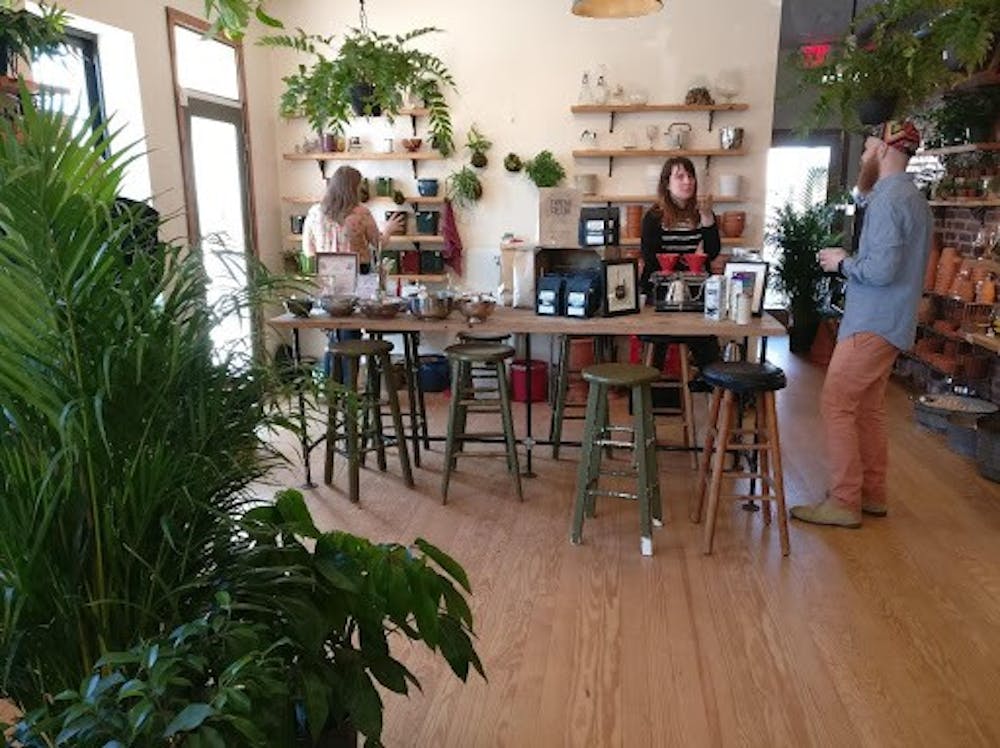New weekend, new coffee thing. You guys are starting to get to know me. Anyway, this weekend, it ended up being the Thread Coffee pop-up shop at B.Willow in Remington.
B.Willow is a plant shop founded on the idea of bringing nature back into our busy lives in school, at work and at home. They sell a wide variety of indoor planting equipment including pots, soils, plants and indoor terrarium kits.
Now, I wasn’t here for the greenery. I was here for the coffee. I had always seen those Thread Coffee roasts and bags at Levering Café and CharMar, but I had never thought much of them. Still, I figured this was my opportunity to find out more.
I spoke with Michelle Fleming, one of the collaborative owners and the head roaster, to discover what Thread Coffee is all about.
Thread was founded in 2012 by Casey McKeel after she worked with an indigenous coffee cooperative in Mexico during college, helping them build infrastructure that symbolically expressed solidarity with their economic independence from postcolonial influences.
Thread began roasting in Red Emma’s Bookstore Coffeehouse in 2012, eventually moving to an independent location at Open Works, a Baltimore makerspace.
In regions where Thread Coffee trades, the national law technically states that women are equal to men, but oftentimes, communities tend to revert back to tribal laws, which do not allow women to manage the money they make.
“We have a lot of interest in women’s rights,” Fleming said. “We pay a higher price for coffee grown by women, to show that they are integral to the process of growing and trading.”
The work Thread does tries to economically support coffee growing communities abroad in a way that acknowledges the mistakes that companies like Toms shoes have made when interacting with economically deprived communities in the past. Thread attempts to counteract the postcolonial effects of economic imperialism.
Building upon the work they do for women producing coffee abroad, Thread hopes to empower women here in Baltimore as well.
This partnership with B.Willow was a natural fit, as Thread sells their coffee there and the two businesses share the common theme of tropical plants. They’re also both local small businesses owned by women.
“We’re a woman-owned business, they’re a woman-owned business, and it’s a nice thing to support other Baltimore area women,” Fleming said. “Oftentimes, we’ll get letters addressed to Mr. McKeel or Mr. Fleming, and people will assume that we need help lifting heavy bags of coffee, but we’ve been doing this for years.”
Thread has successfully formed strong bonds with other members of the Baltimore coffee community like Vent Coffee Roasters, which hosted the Latte Art Throwdown at Union Craft Brewing that I wrote about last week. Michelle Fleming was actually one of the judges. It's cool how you can see familiar faces almost everywhere within the Baltimore coffee scene.
She emphasized the importance of a supportive coffee industry and that there is space for multiple roasters because different roasters have different unique strengths.
So what does it take to become a coffee roaster?
Fleming acknowledged that not everyone even knows the rough details of how coffee is produced and processed.
“I was going through border security coming home from doing work abroad one time," she said. "I said I was a coffee roaster, and he was like, ‘you learn something new every day.’ Well, the beans don’t come brown.”
Fleming has a certification from the Specialty Coffee Association, a national non-profit trade organization.
“You really only control two things: the amount of air that flows through the chamber over time. But in order to know how to do this properly, you’ve got to be tasting coffee all the time," she said. "The bean has to be roasted consistently all the way through to the right amount, or else there might be a sort of flat or baked flavor.”
Operating such a business is no easy task on the administrative side either. With all sorts of federal and organizational certifications flying around on top of the concern of paying farmers, it can get confusing to determine where money would be best spent.
For example, fair trade used to mean a lot. Now, most specialty coffee roasters are fair trade. Fleming also mentioned the USDA Organic certification seal.
“We could definitely get that certification because our coffee is organically grown, and we know that from communicating with and buying directly from the farmers. But that money just goes to the USDA. I’d rather be paying farmers more and strengthening our business and their communities that way,” she said.
As for their location, Thread moved into the Open Works building in Greenmount. They share the space with the 100 percent worker-owned and operated Greenmount Coffee Lab (communism, yeah!), which acts as a sort of tasting room for Thread’s small batch and newer coffees. Greenmount Coffee Lab is a project of Red Emma’s, the radical bookstore/vegan café that served as the former roasting space for Thread.
A quick note on the coffee she served me: It was Pharaoh, an Ethiopian washed coffee from the Sidamo Province. It has a natural sweetness resulting from it being grown at high altitudes and having smaller, denser beans. This coffee is not widely available, but it is a great example of one that would be served at the Greenmount Coffee Lab.
The coffee world is so fascinating, and it’s thriving in Baltimore these days. I would encourage any Hopkins students who aren’t busy studying, complaining or protesting to walk outside of the bubble and give the scene a quick whirl.





